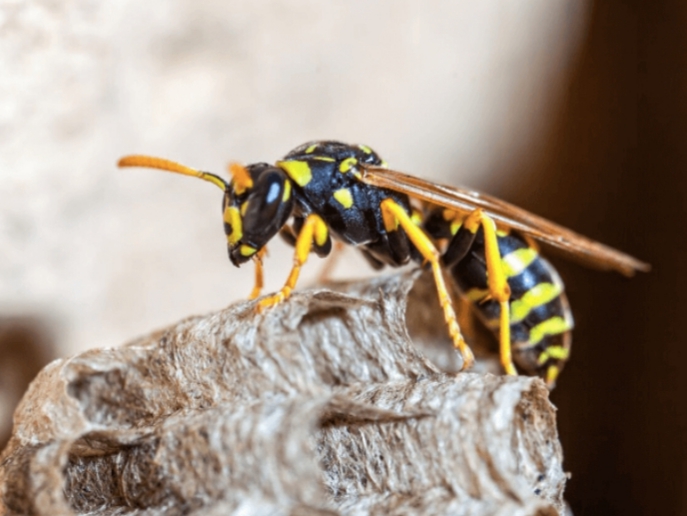
The earlier a wasp problem is identified, the easier and safer it is to eradicate. If you are worried that you may have a wasp problem at your property these are the signs to look out for.
- Swarm of Wasps – Wasps can often be seen coming and going from their nest, giving you an idea of where their nest might be. Seeing large number of wasps in and around your home or work is the sign of wasps’ nest or attractant nearby.
- Noise – If you are hearing buzzing sounds this may be a sign of wasps nest nearby. if you are hearing buzzing sounds from above and unsure where they are coming from it may be a wasps nest in your roofing.
- Nest structure- A nest can be different shapes and sizes. Peak time when a wasps nest is at its biggest is late summer and could contain from 5,000 up to 25,000 wasps!!
A professional pest controller has the technical knowledge and access to a range of professional use, highly effective insecticides which are not available to the public. Central Pest Control technicians will wear protective clothing and will apply treatment directly into the nest at the entrance and may be able to remove it. The wasps will bring the chemical into the nest and after a couple of days the wasps will die from the dose of pesticide. If a wasps nest is treated correctly, it will start to die within an hour. We advise customers to keep away from the area around the treated wasp nest until no wasp activity is seen. It may also be necessary to keep doors and windows shut near the nest after it has been treated.
Pro Tip – Do you want to be able to have your doors and windows open to your premises without having to worry about wasps and other flying insects entering? Then insect fly screens are for you, as they will deny these nuisance pests access, while still keeping your property cool in the warmer months.
Why it is important to get the professionals.
Central Pest Control would always recommend you call a professional pest control company for the removal of your wasp’s nest. We will identify where the nest is located, and we will treat it using professional insecticides which can not be gotten by the public. As wasps have an aggressive nature, they will become very angry when their nest is disturbed. You have a duty to keep your family, staff and customers safe and attempting to remove a nest without calling the professionals who have experience, can trigger wasps and result in nasty stings to whoever may be near. If you are running a business this could give your company a bad name. We are trained in dealing with this with over thirty years of removing wasps nest we have come across wasps’ nests of all shapes and sizes. We will wear protective clothing from head to toe while removing the wasps’ nest and ask of you to keep clear while we are removing the nest.
Preventing Wasps and their nests
- Check for nests early – check the most likely spots for wasps to build their nests. Garages, sheds, lofts and under eaves should all be checked in Spring while nests are still small – around the size of a golf ball. A nest the size of a golf ball is much easier to deal with than when it grows the size of a football in the late Summer.
- Keep windows and doors shut – this will prevent wasps access into your property. Fly screens can stop wasps getting into your home or business, while remaining cool in the hotter months.
- Keep bins closed – open bins will attract wasps looking for food. Bins should also be kept away from your property. Keep outdoor eating areas clean to minimize a food source for wasps.
- Seal gaps and cracks in exterior walls, roofs and foundations to prevent wasps from entering.
- Installing mesh screens on windows, doors and vents to keep wasps out while maintaining airflow.
- Eliminate water source as wasps need water for their survival and will be attracted to birdbaths, pet water dishes or leaky faucets.
Wasps Sting – if you have been stung by a wasp, we recommend the following treatment:
- Wash the sting with water.
- Apply ice to the area.
- Take an antihistamine.
- Some people may be allergic to stings and can have a more severe reaction to being stung including chest pain, swelling of the throat and faintness – this is the time to get medical help.


